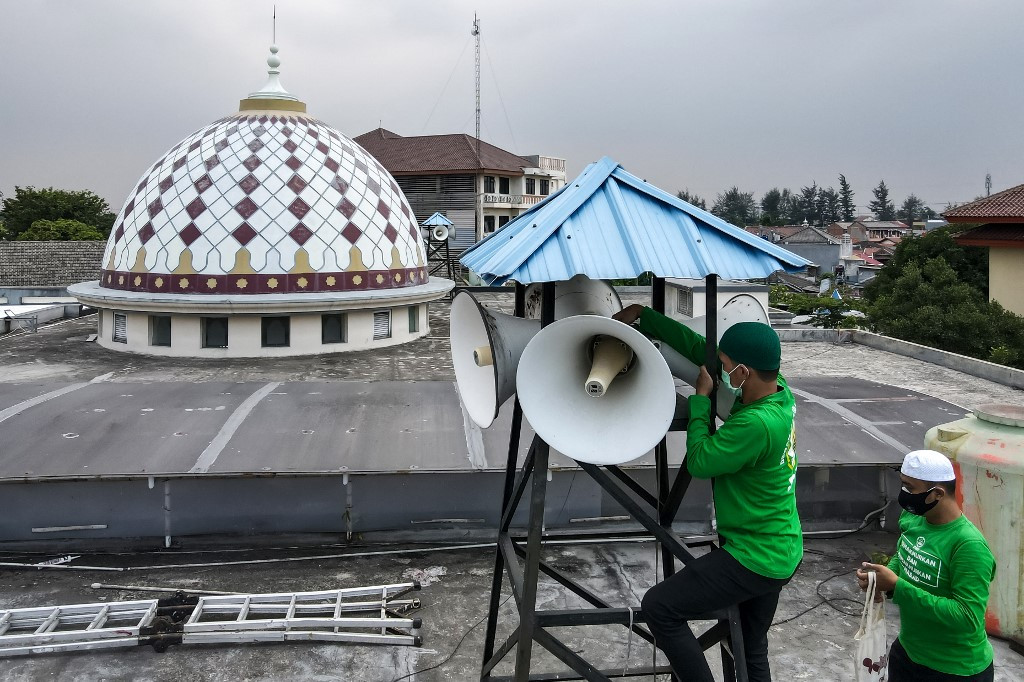Measuring the decibels of piety

Image - The Jakarta Post
Visitors to Indonesia beware: Sound off about visual pollution from billboards or trash in rivers or the CO2 assaults on lungs and listeners will nod. But stay mum about noise if the source is a place of worship. That could be considered blasphemous. The government is tentatively inching towards reform – but not all see a problem.
Compared to its neighbours Indonesia is a relatively liberal state. The adverb recognises sweeping generalisations get undermined by the termites of details. First is that ‘liberal’ can be contentious in the world’s most populous Islamic country.
Elsewhere the word usually has positive connotations but for some of our neighbours, ‘liberal’ is synonymous with Western individualism and imagined immorality. In 2005 the Majelis Ulama Indonesia (MUI - Council of Islamic Scholars) issued a fatwa against pluralism, secularism and liberalism.
Domestic politics were a factor in the peak authority’s prohibition which is not legally binding. Four years earlier the nation was shaking itself out from under 32-years of President Soeharto’s boot to become a ‘partly free’ democracy. Leading intellectuals fearing the growth of extremism started the Jaringan Islam Liberal (JIL - Liberal Islam Network), jarring the MUI.
JIL meetings are comfortable places for the open-minded to relax and yarn, but foreigners need to be careful when speaking outside the circle. It’s OK to whinge about Jakarta traffic and pot-holed roads but shouting against noise pollution can be perilous.
Sunni Muslims (the majority in Indonesia) believe one of Prophet Muhammad's disciples dreamed that followers needed a continuous reminder of their duties so adzan (call to prayer) was adopted.
No probs in the seventh century when amplification was limited to cupped hands. But 1200 years later Scottish inventor Alexander Graham Bell started jiggling with electromagnetism, bringing joy to musicians and misery to the reserved.
For Indonesian Muslims loudspeakers have been a godsend, installing them high and turning up the volume to MAX +. In some mosques, the ustadz recites the prayers and tweaks the knobs with consideration for others. If the preacher can sing the effect can delight whatever the listener’s faith.
At the other extreme small boys learning to recite the Koran and given open mikes provide the best nails-on-chalkboard experiences.
Christians can be just as raucous in provinces where they’re the majority, like North Sulawesi. On Sunday mornings it’s hard to ponder and impossible to talk when preachers think the Deity is hard of hearing so needs awakening with a good yelling and bell bash.
Grumbling is reserved for the politically and religiously untouchables. Former Vice President Jusuf Kalla once found the courage to publically remind mosques to keep volumes down, though too little too late.
His call to be reasonable followed a riot in Tanjung Balai, North Sumatra after a middle-aged local woman told a neighbour that noise from a nearby mosque was hurting her ears.
Unfortunately, Meiliana (one name only) is ethnic Chinese and a Buddhist so labelled kafir (unbeliever), an inflammatory combination. In 2016 fourteen temples were reportedly firebombed and plundered by mobs asserting hurt feelings; the mother of four – who told the court she only wanted the volume turned down - copped 18 months behind bars for blasphemy.
Human Rights Watch claims more than 150 people, mostly from Indonesia’s religious minorities, have been convicted under the blasphemy law since 2004.
Kalla’s request for a show of the tolerance his nation is supposed to display was ignored as mosque management is largely a local matter. There are no structured levels of authority as in Catholicism. However, there’s now a slight chance of change with new guidelines announced last month [Feb] by the Ministry of Religious Affairs.
These suggest a limit of 100 decibels; according to one technical site it’s a level ‘considered dangerous to human hearing … and equal to using a lawnmower or a jackhammer.’ The guidelines limit loudspeaker use to the five daily calls, each ten minutes max.
Times shift according to the positions of the sun, but currently Fajr - 4:48 am, Zuhur - 5:58 am, Dhuhr - 12:05 pm, Asr - 3:10 pm, Maghrib - 6:11 pm and Isha 7:17 pm.
Minister Yaqut Cholil Qoumas claimed the prescribed level will be sufficient ‘to reach the ears of Muslims while preserving harmony with adherents of other faiths at the same time.’ Numerically followers of the five other approved isms – Catholic, Protestant, Buddha, Hindu and Confucius – exceed the population of Australia but are tiny minorities in a nation of 273 million, so usually keep their mouths shut.
All seemingly mild, though not to the right-wing Partai Keadilan Sejahtera (Islamic Prosperous Justice Party) which reckons Qoumas should keep his fingers off the knobs. ‘Let the people manage mosque loudspeakers in accordance with their traditions,’ PKS lawmaker Bukhori Yusuf reportedly said. ‘The rules can differ from one village to another.’
Indeed. This writer counted eight mosques or mushollas (prayer rooms) all with sound systems along a 2.5 km road linking two tiny villages in East Java. To report that this produces a cacophony might be unwise, so best suggest that some might argue the mix adds to the riches of diversity.
Qoumas has been reported comparing mosque noise with barking canines, animals considered unclean in Islam, but that’s probably a Trump-style dog whistle from his opponents. Before the pandemic, it was joked that foreigners offered unusually cheap housing should view the property carrying a decibel meter.
One solution is to send calls to prayer on smartphones, heard only by the recipient. To preserve the peace this idea is best floated by Pak Kalla or Minister Qoumas.
The late Abdurrahman (Gus Dur) Wahid (1940-2009), Indonesia’s fourth president, an outspoken humanitarian and committed liberal, told zealots fossicking through the detritus of casual chat for imagined insults to their faith: God doesn’t need to be defended.
First published in Pearls & Irritations, 14 March 2022: https://johnmenadue.com/measuring-the-decibels-of-piety-in-indonesia/

No comments:
Post a Comment